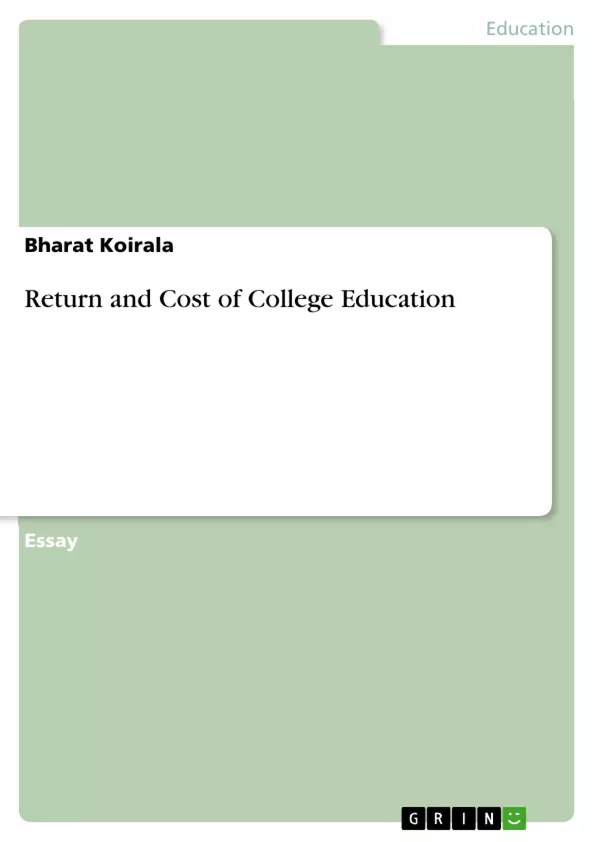Getting a college education has always been a matter of importance in every part of the world. A child joins the school at an early and continues his/her study for several years. A person invests 15 to 20 years of life getting education from school and colleges. Even though a child learns many necessary things from high school, college education is meant to equip the student with the essential skills required to acquire jobs and improve their living standards. It is also expected to provide students with the credentials needed to get good jobs from employers are aware that the student with valuable degrees has the skills to perform their duties efficiently. It is true that the majority of the courses taught in most of the colleges in the world are expensive. Students have to save several thousand dollars to complete the course. But, it becomes very hard to earn the sufficient money after getting educated.
Inhaltsverzeichnis (Table of Contents)
- College Education Return and Cost
- The Debate: Cost vs. Return
- Rising Tuition and Stagnant Wages
- Indirect Costs: Books, Activities, and More
- The Argument for Quality Education
- The Argument Against Increased Cost
- The Inefficiency of College Education
- Lack of Practical Skills
- The Role of Faculties/Professors
- The Focus on Credentials Over Skills
- The Importance of Practical Majors and Reputable Colleges
- The Benefits of Networking and Credentials
- The Promise of a College Education: Achieved or Not?
- The Impact on the Job Market
- Minimum Wage Rates and Career Choices
- Globalization and Changing Job Market Trends
- The Impact of Skills Demand
- The Argument Against College Education Being Expensive
- The Value of College Education Beyond Job Skills
- The Value of Multiple Degrees
- The Value of Textbooks and Self-Learning
Zielsetzung und Themenschwerpunkte (Objectives and Key Themes)
This text explores the complex relationship between the cost of college education and the return on investment it offers. The author examines the debate surrounding rising tuition fees, stagnant wages for graduates, and the increasing burden of student loans. The text delves into the perceived inefficiencies of college education, highlighting the disconnect between academic knowledge and practical skills required in the workforce. Additionally, the author analyzes the impact of the changing job market, global trends, and the role of practical majors in shaping career choices.- The rising cost of college education
- The perceived lack of return on investment in college education
- The disconnect between academic knowledge and practical job skills
- The influence of the changing job market on career choices
- The value of college education beyond job skills
Zusammenfassung der Kapitel (Chapter Summaries)
This text is not structured into chapters, but rather as a continuous argument. It examines various facets of the relationship between college education and its value in the job market.- The text begins by establishing the debate surrounding the cost of college education and its return on investment. It discusses the rising tuition fees and the difficulties graduates face in finding well-paying jobs that match their qualifications.
- The author then analyzes the argument that high tuition fees are justified by the provision of quality education and access to resources like libraries, health clubs, and sports facilities.
- The text delves into the inefficiency of college education, highlighting the lack of focus on practical skills development, the role of faculties/professors in teaching, and the emphasis on credentials over skills.
- The author explores the importance of practical majors and reputable colleges in securing employment opportunities, while also discussing the benefits of networking and credentialing.
- The text examines the argument that college education does not always fulfill its promise of providing opportunities commensurate with qualifications, attributing this to the focus on generating income quickly and the lack of credentials and networking opportunities for students attending less prestigious institutions.
- The author then explores the impact of college education costs on the job market and how minimum wage rates, globalization, and changing job market trends influence career choices.
- The text concludes by presenting arguments against the notion that college education is expensive, emphasizing the value it offers beyond job skills, the importance of multiple degrees, and the value of textbooks and self-learning.
Schlüsselwörter (Keywords)
The core topics explored in this text include college education, cost, return on investment, job market, practical skills, credentials, networking, career choices, globalization, and the value of higher education beyond job skills. The text touches upon important themes such as student debt, underemployment, and the changing landscape of the labor market in relation to higher education.Frequently Asked Questions
Is a college education worth the high cost?
The debate centers on whether the long-term benefits, like improved living standards and job credentials, outweigh the thousands of dollars spent on tuition and stagnant wages for graduates.
What is the "disconnect" in modern college education?
Many argue there is a lack of practical skills being taught, with institutions focusing more on academic credentials than the essential skills required by employers.
How do reputable colleges influence job prospects?
Attending a reputable college often provides better networking opportunities and credentials that are highly valued by employers in a competitive job market.
What are the indirect costs of college?
Beyond tuition, students face costs for books, extracurricular activities, health clubs, and other campus resources that add to the financial burden.
Does globalization impact the return on education?
Yes, globalization and changing job market trends influence which degrees offer the best return on investment, making practical majors increasingly important.
- Citar trabajo
- Bharat Koirala (Autor), 2014, Return and Cost of College Education, Múnich, GRIN Verlag, https://www.grin.com/document/294372



